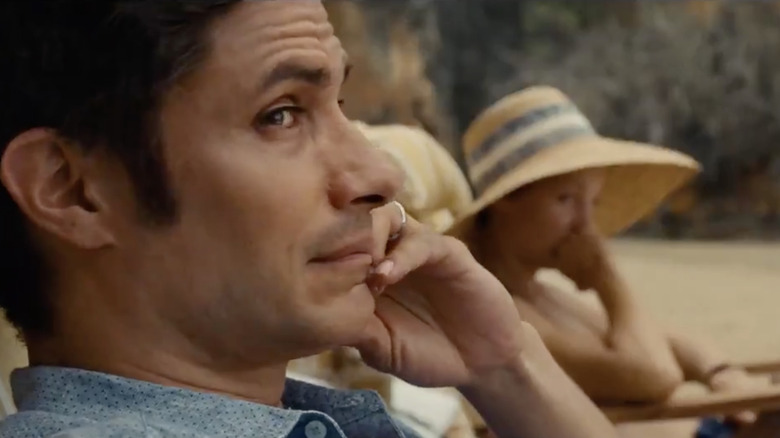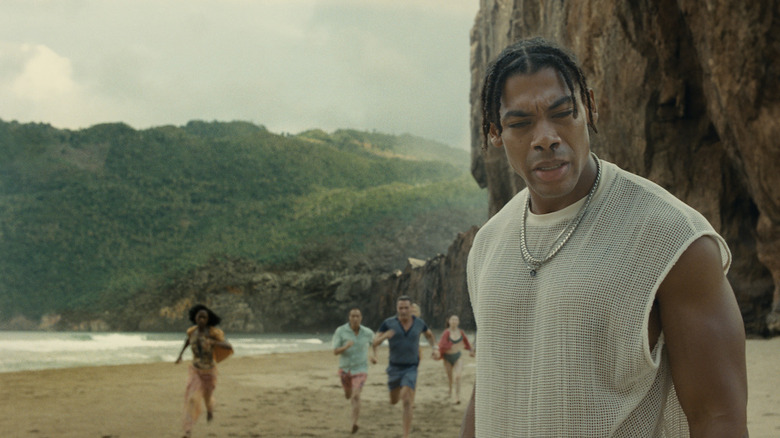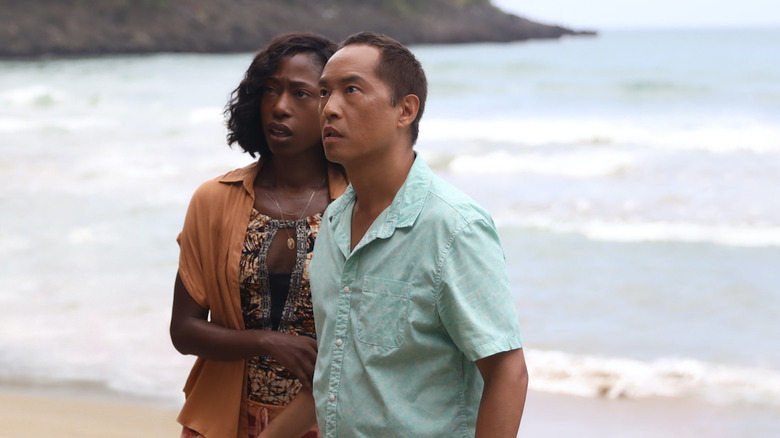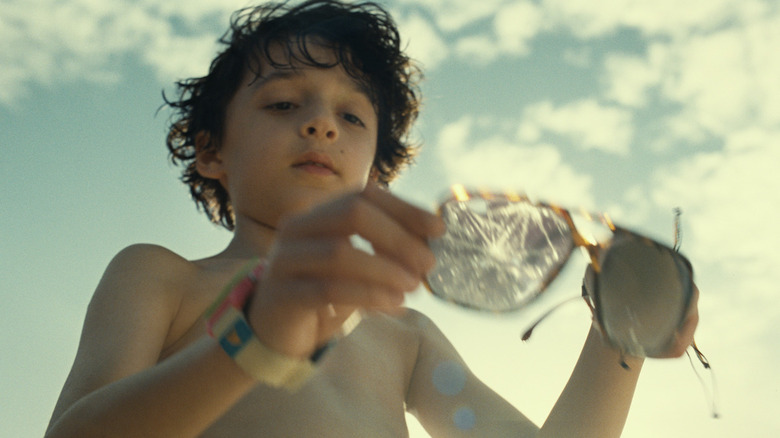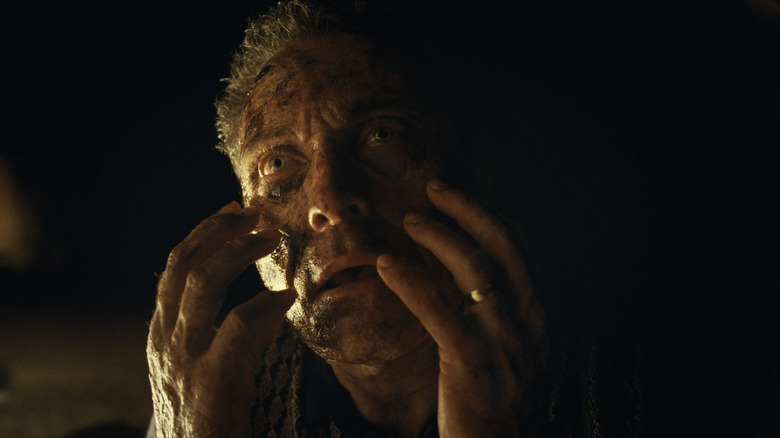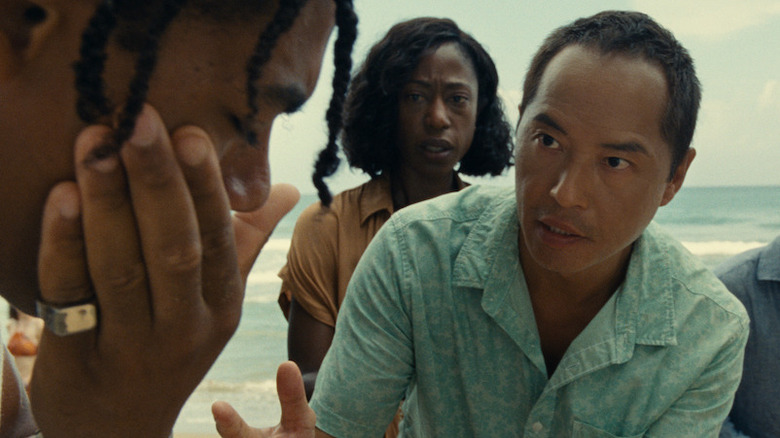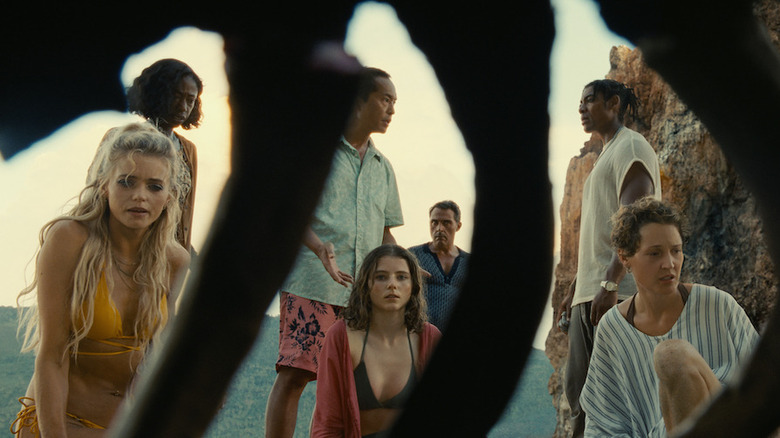Biggest Unanswered Questions In Old
In our review of M. Night Shyamalan's new film "Old," we discussed how the film feels a lot like the modern classic ABC drama "Lost," only squished into a sub-two hour runtime. The film follows a group of families trapped on a private beach that causes them to artificially age at a much faster rate, essentially making a lifetime pass by in a single day. But the same way "Lost" was loosely about a crashed flight's inhabitants surviving on a mystical-seeming island, each passing episode presented new sub-mysteries for viewers to try to solve. Over the course of six seasons, a fair number of questions remained. No matter how cathartic and emotionally satisfying the finale was, leaving those nagging mythology nitpicks unresolved left a sour taste in people's mouths, such that they still complain about the show's ending to this day.
"Old" takes an equally enthusiastic approach to bombarding its audience with new ideas, baffling concepts, and questionable bits of intrigue, all in less time than the "Lost" pilot episode. So of course the closing credits left us with some lingering concerns and intense curiosity as to what exactly we just saw.
Here's our best attempt to catalog the biggest questions Shyamalan left unanswered in "Old," with the major caveat that these looming inconsistencies are probably a feature, not a bug — and this movie is so relentlessly crazy that it's entirely possible coherent answers may exist within the text, but they will certainly require several more repeat viewings to figure out.
Why was Mid-Size Sedan's nose bleeding?
One of the film's earliest non-fast aging related mysteries in the film comes with the introduction of the lone stranger on the beach played by Aaron Pierre, who Maddox (Alexa Swinton) correctly deduces is famous rapper Mid-Size Sedan. How a rapper got famous with that stage name is a whole other unanswered question we don't have time to unpack today, but the first thing we notice about him, besides Rufus Sewell's Charles having such overt, racist hostility towards him, is that his nose keeps bleeding. It's one of the first unnatural things (of many) that pops up on the beach, but outside of Sedan referencing being diagnosed with an unspecified blood disease, it's never really addressed or explained.
Given the way Prisca's tumor and Charles' schizophrenia both get worse as their time on the beach goes on, it's not out of the realm of possibility to just accept that his nosebleeds are related to the diagnosis. But unlike most other medical revelations within the cast, where either Charles or Jarin, a registered nurse, explicitly draw onscreen conclusions from each of the bodily phenomena they encounter, Sedan never verbally puts those two things together.
Perhaps Shyamalan felt comfortable the audience would complete that problem themselves just fine, but taken alongside multiple, similar more obvious connections being broadly spelled out onscreen, it's not crazy to suggest this truly is a mystery left unresolved for the same reason much of "Old" feels so inscrutable. It's another way to keep the audience as off-kilter and ill at ease as the beach's unfortunate inhabitants.
Why did Patricia die?
In the film's final act, it's revealed that every one of the beach's inhabitants is an unwilling participant in a medical trial study. The resort is a front for an organization testing experimental new drugs on handpicked subjects — since the island's natural energies cause people to age so rapidly, they can conduct years of study within an afternoon. When all the subjects for this particular trial have died, one of the scientists, Sidney (Matthew Shear from "Mistress America") explains that the tragedy wasn't all for naught, as their new epilepsy drug worked on Patricia (Nikki Amukka-Bird), preventing her seizures for 16 years in beach time. But when Patricia dies in the second act, it's from a series of violent seizures that take her life.
Now, every other death on the beach that isn't self-inflicted or literal murder is either an accident or the ravages of aging, essentially natural causes. But Patricia isn't shown to have aged fast enough to be of old age, the way Guy and Prisca eventually go out. After roughly a half hour of screen time without a seizure (just the repeated worry that she could have one at any minute), she succumbs to a series of them in short order and dies. But if the new drug was such a success, how did a seizure still kill her?
It's entirely likely that the scientists behind this project just have lower barriers for success relative to their murky moral barometers than the average viewer might. Their final act celebration certainly sounded rousing enough to suggest the drug would prevent someone from dying from seizures, much less having them at all. If the simple answer to how she died is that the medication works well, but just not that well, it really means these folks are compartmentalizing and patting themselves on the back even more than initially thought. Harsh.
What was Idlib's whole deal, anyway?
Only seen in the film's first act before reappearing in the finale, Idlib (Kailen Jude) is a child at the resort who Trent (Nolan River) befriends early on. Idlib is precocious and charming, and the two share a love of decoding puzzles and asking grown-ups what they do for a living. He's an adorable side character, one whose dramatic admonishing from the resort manager proves to be a compelling bit of foreshadowing about this retreat not being all it seems.
Near their wits' end, Maddox and Trent, now in their 50s and played by Embeth Davidtz and Emun Eliott, remember that Trent never finished the last of the decoder letters he received from Idlib before they got to the private beach that's taken all their loved ones. In finally cracking it, Idlib left them a clue as to how to finally escape the beach, by using the coral under the water as a kind of psychic shield from the beach's adverse effects.
It works, saving their lives and helping them expose the resort for what it is. But outside of a tender moment between Idlib and his now middle-aged friend Trent reconnecting a whole day after meeting, we never get the full tea spilled on who Idlib really is, other than that he's been at the resort long enough to understand certain things about it and that he's used to seeing people come and go, whether or not he knows for sure that when they "go" they actually "die." He's said to be the nephew of the resort manager, but since the manager is shown to have a very casual relationship with the truth, the audience can't necessarily trust that explanation.
Is he a child that was born from one of the other 72 trial groups that survived and is being raised by the resort's employees? That feels the most likely, but as bonkers at "Old" is, his true origins could be literally any random nonsense and it would still somehow feel internally consistent.
How did Prisca kill Charles?
One of the other weird things that happens on the beach is that each of the trial subjects has seeming invulnerability until ... they don't. So when Charles slashes at Mid-Size Sedan with a knife, his face cuts heal immediately, but when he stabs him repeatedly in the vital organs, he dies. The movie houses a lot of theoretical word salad trying to resolve all these strange goings on, so if there's a definitive explanation for this particular quandary, it's easy to miss.
But the most confounding element of this comes when Prisca must defend a fully unhinged Charles from murdering her husband Guy the same way he ultimately did Sedan. She fends him off with a rusty knife and when it pierces his skin, Charles' entire body begins to transform like a particularly involved fatality from "Mortal Kombat" as she matter-of-factly explains that the rust on the knife is like poison in the human bloodstream. That actor Vicky Krieps delivers this dialogue with an absolute straight face is borderline astonishing, because no matter how crazy "Old" gets, that's a far from satisfactory explanation for the cartoon death Charles undergoes. Charles was able to kill Sedan with a regular knife and ... a lot of persistence? But to defeat Charles, Prisca needs a special rusty knife that destroys his entire body like a vampire getting dusted on "Buffy the Vampire Slayer"?
We're willing to chalk this one up to "well, this doesn't make a lot of sense, but it sure does look pretty cool."
Why is the beach, y'know, like that?
In the film's final series of revelations, the resort manager talks to his staff about how nature gave them this beach anomaly and all the supernatural effects it brings, suggesting nature itself wanted this place found and exploited through man-made means to help heal the sick. it's a stirring supposition to rally a team around, especially if you need to, on a daily basis, help them make peace with killing innocent people in the pursuit of medical breakthroughs. But how exactly is the beach, you know, like that? Who found it? How long it did take them to tap into their capitalistic instincts to turn it into a murder farm for Big Pharma?
Obviously, the experiments themselves took a lot of trial and error, but how much trial and error happened in this region, accidentally, from people freaking out and turning geriatric before sundown before some enterprising chap came along and was like, "hey, let's use this naturally occurring hellscape to sell better drugs?"
Honestly, the core origins of the island and the beach itself could branch off into 30 or 40 more sub-unanswered questions, but there's really only one more that cannot be ignored.
How exactly does the resort function?
Trying to reverse engineer the complete history of the beach and its origins is a fool's errand — or, more likely, the problem of whoever Shyamalan tasks with expanding the mythology into some kind of direct-to-streaming prequel miniseries in the event "Old" does numbers at the box office. But there's a more pressing question the viewer is left with at the end of "Old" while Maddox and Trent are on their way home from exposing the resort's true nature. If the resort manager isn't blatantly lying, and his fervor suggests at the very least he believes in what they're doing, that means that even though (theoretically) a thousand or so people have died over these 73 trial groups, the findings from the study have served to save thousands more, perhaps millions. So, if what they were doing was unsavory but necessary work, were Maddox and Trent in the right for exposing them?
But that question raises a bigger question. Is all the rhetoric the manager and his colleagues spew at one another legit and this is a purely humanitarian enterprise designed to help the world, despite having to let tons of people die to do so? Or, and in this is key, is that just the rah rah pizza party company line they all tell themselves to sleep at night, and this resort is just a more science fiction take on the kind of exploitative work all major corporations require in order to provide ample value for their shareholders?
If it's the former, then maybe Maddox and Trent were justified, especially considering they have now lost half their lifespans, not to mention their own parents. This place clearly needs more oversight. But given how well they were able to operate without interference from law enforcement suggests that whoever founded this operation also had the grease to keep them shrouded from regulatory agencies and other powerful organizations that should have put a stop to this far sooner.
Regardless, we can all probably agree that despite any potential greater good, there's got to be a more efficient way to cure disease than this labyrinthian ordeal that caused such a stressful and confounding cinematic experience.
